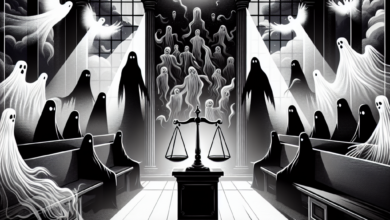Justice in a Jar
In a small, forgotten village named Eldermere, rumors whispered of a mysterious relic—a simple glass jar said to contain the essence of justice itself. Legend had it that whoever possessed the jar could rectify wrongs, even those deep-rooted in the fabric of time. Eldermere was a quaint place with cobblestone streets and thatched roofs, but it was plagued by secrets and inequities that festered in the hearts of its residents like unshed tears.
The villagers had long accepted their lot, but in the hushed corners of the tavern and the market, a deep-seated frustration brewed among them. Their suffering came not just from the weight of injustice meted out by those in power but also from their own complicity in turning a blind eye. It was a cycle of misery, one that left a bitter taste on the tongues of those who dared to envision a better world. Amidst this quiet despair lived a young woman named Clara.
Clara was known for her kind heart and fierce spirit, often taking it upon herself to help the most vulnerable residents of Eldermere. With her scraggly brown hair tied back and her spirited eyes shining bright, she spent her days caring for the elderly, playing with children, and tending to the needs of her neighbors. Yet, beneath Clara’s warm demeanor lay a simmering dissatisfaction, a feeling that her efforts were mere bandages on a festering wound.
One twilight evening, while rummaging through the attic of her late grandmother’s cottage, Clara stumbled upon a peculiar object—the fabled jar. It was no larger than a coffee mug, with swirling designs etched into the glass, gleaming with an otherworldly hue. Riddled with disbelief, she recalled the village tales of the jar capable of dispensing justice, and as she held it in her trembling hands, an unexplainable warmth enveloped her.
Her mind raced with possibilities. Could this truly hold the key to the injustices suffered by her friends and neighbors? Was this a gift or a curse? Clara took a deep breath, convinced that she had to find out.
That night, Clara called a clandestine meeting with several villagers she trusted—Maggie, the baker whose family had fallen victim to the duplicitous tax collector; Elias, a mild-mannered blacksmith whose son had been wrongfully accused of theft; and Anya, a single mother struggling to keep food on the table while dealing with an abusive ex-husband. They gathered in Clara’s dimly lit living room, their faces glowing with flickering candlelight and hope.
“Here it is,” Clara began, placing the jar on the table like a talisman. “The stories are true. This is Justice in a Jar. It can help us.”
Whispers filled the room as the villagers exchanged glances, skepticism mixed with eagerness. “How do we know it works?” Maggie asked, her voice techy but laced with intrigue.
“We test it.” Clara’s determination shone through her voice. “We each have our grievances. Let us put the jar to the test before the harvest festival. We shall ask for justice on behalf of those who have suffered.”
As they spoke, a flicker of hope ignited among them, though trepidation lingered in the air. Finally, they agreed to adopt the jar as their beacon of change. Each villager took turns pouring out their grievances, careful to frame their requests with clarity and intent.
With their first request, Clara held the jar tightly and spoke firmly, “We seek justice for the baker, Maggie, and her family. We wish to see the tax collector’s grasp reined in, exposing his corruption.” As she finished, a flash of light erupted from the jar, illuminating the room before dissipating into the night.
“What in the name of the stars was that?” Elias exclaimed, his eyes wide.
“I don’t know,” Clara admitted. “But let’s see if anything happens.”
Over the days that followed, whispers about the tax collector’s corruption spread like wildfire. Insidious details of his dealings made their way to the mayor, who promptly launched an investigation. The villagers rallied behind Maggie, their solidarity becoming a light against a backdrop of injustice.
Encouraged by their first success, they each took turns asking the jar for justice. Clara herself sought to arise for Elias’ son, who remained locked away in a cell for a crime he hadn’t committed. When seeking justice for Anya against her ex-husband, the jar vibrated with energy, releasing sparks that danced in the air.
News of the jar’s power began to ripple through Eldermere, bringing both hope and fear. The villagers found newfound strength—banding together to confront their oppressors. Slowly, the faces of opulence began to change, overshadowed by the collective will of the weary. Clara’s heart swelled with pride, yet she couldn’t shake the disquiet building in her chest. Commendations and admiration of the villagers turned towards Clara, thrusting her into a place of unexpected authority.
As the festival approached, Clara sensed the shifting of tides. The injustice sought not only to linger but adapt and retaliate. Late one night, as she sat beneath the stars, contemplating the jar, she felt a strange vibration thrumming in the air. It seemed to draw her in, and Clara cautiously picked it up, staring deep into its swirling depths.
“Tell me your truth,” she whispered.
The jar glowed intensely, illuminating the darkness with blinding radiance. Suddenly, Clara was no longer in her cottage but standing in an ethereal space, entwined between reality and the shadows of time. Vision after vision unfurled before her—images of past grievances and present turmoil, all spiraling together, revealing the dark heart of humanity’s choices.
In that mesmerizing tableau, Clara witnessed the true emanations of justice—pain and retribution naturally intertwined. Every wrong was a thread woven into the fabric of the present. In her effort to correct injustices, she realized she might be unwittingly unraveling the threads that held her village together.
“No!” she gasped as the shimmering light faded, plunging her back to her cottage. Fear gripped her heart as she saw the villagers’ shadows in the doorway. They had witnessed her disquieting transformation.
“What did you see?” Anya bravely stepped forward.
“Justice is not simply about punishment but about balance,” Clara confessed. “I felt its weight—a burden we might not be ready for. The jar offers quick justice, but it may unravel more than it heals.”
As the villagers processed her words, murmurs of doubt filled the room. “What if we lose everything we fought for?” Maggie questioned, eyes shimmering with uncertainty.
“We must proceed with caution,” Clara warned. “We must seek justice not just for our grievances but understand the whole story—the deeper connections that bind us. We cannot act in haste.”
The villagers spent hours deep in discussion, weighing their choices, pondering the consequences they’d unknowingly sown. When the festival day arrived, they stood at the edge of the main square, feeling the pulse of the village around them. With Clara leading them, they decided to present their case not just for retribution but for healing, unity, and understanding.
“Justice in a jar is not just about punishment,” Clara amplified her voice, standing before the gathered crowd. “It lies also in reconciliation and community. We must seek justice that heals, nourishes, and binds us together again.”
As Clara spoke, she felt the jar hum gently in her pocket. The villagers listened, faces shifting from doubt to recognition—the seeds of change were beginning to take root.
Yet, as the day wore on, tension crackled in the air. There were still those resistant to the swell of collective unity, including the mayor, uncomfortable with the shift in power. Sensing discontent, Clara resolved to speak with him directly.
“I have seen your motivations,” the mayor warned, his voice low and threatening. “The jar’s power is not linear, Clara. It would be foolish to test it against those who hold authority. There are consequences; you’ll disrupt the order.”
“And what order have you given them?” Clara shot back, aware yet unyielding. “Their fear has held them prisoner. Justice must be built upon truth, not suppression.”
The mayor scoffed. “Then you propose chaos?”
But Clara’s resolve hardened. “No. Justice must rise like a phoenix from the ashes of pain. We will forge a new destiny, one that is chosen together, not dictated by fear.”
As she spoke, a collective voice echoed through the crowd, igniting affirmation and solidarity. Together, they confronted the mayor, demanding transparency, justice, and equality—for all.
The following days flooded Eldermere with change; the jar became not just a relic but a tool for introspection and community dialogue. Clara established forums for the villagers to speak – to voice their grievances and listen to one another. They grappled with hard truths, recognizing that justice stood as a bridge between them rather than a weapon.
Yet, in this pursuit, Clara understood that justice would sometimes invoke discomfort. But true healing required navigating through both light and dark—embracing their traumas to foster a more profound understanding of one another.
Months passed. By the time the next harvest festival rolled around, the village bore witness to unprecedented transformation. With the jar revered not as a vessel of punishment, Clara and the villagers embraced its true calling—one of empathy, healing, and reconciling differences.
On the evening of the festival, Clara stood before a gathering of her friends and neighbors, the jar perched on a table adorned with flowers at her side. “Tonight, we celebrate not just what we have fixed but what we continue to learn,” she announced, warmth filling her voice.
As the villagers raised their cups, Clara felt a contentment unfurl in her heart. From the jar flowed not just justice, but an understanding—highlighting that true justice required not just a solitary act but an entire community’s spirit.
Years rolled by, yet the jar remained—a keeper of tales and vigilance. In Eldermere, justice transformed from an abstract concept into a living, breathing practice navigated daily by resilient hearts. And through Clara’s guidance, it thrived on compassion, acknowledging wounds, and cultivating deeper connections forged in the fires of true understanding.
In the quiet of her nightly reflections, Clara often spoke softly to the jar, “Thank you for bringing us together. Justice must always be in flow, a balance, a breath—each action rippling like a pebble tossed into a pond. We’ll carry this legacy forth, like guardians of a promise made together.”
And so it was, in the heart of Eldermere, justice remained not imprisoned in a jar but flowed freely, alive in the spirit of its people.




